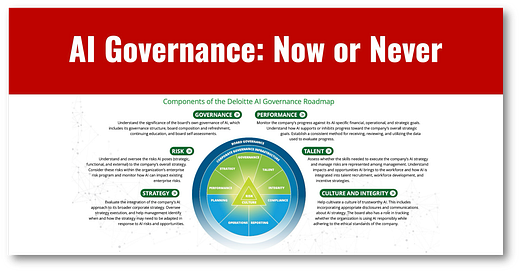This is my daily post. I write daily but send my newsletter to your email only on Sundays. Go HERE to see my past newsletters.
HAND CURATED FOR YOU
How many reports have you seen today saying AI will “change everything?" Probably quite a few, but how many have you seen demanding changes in AI governance?
Kudos to Deloitte for producing a paper that demands direct responsibility for AI and goes straight to the boardroom. Everyone working with AI should read this paper.
The problem remains that management consultants produce 10 papers telling readers that AI will “change everything” to one paper on either AI management or AI risk. While unscientific, let me know in the comments if this ratio feels right.
At this point in the AI development cycle, readers shouldn't be surprised to learn that AI demands board-level oversight. It should be clear that AI presents real risks, and board-level involvement would seem obvious.
So brace yourself for the results of an ISS insights survey in March of 2024 that found only “15% of companies in the S&P 500 disclosed board oversight of AI, including 38% of companies in the Information Technology sector.” (HERE)
Deloitte conducted a survey in October of 2024 that shows how bad things are: Only 14% of respondents say their board discusses AI at every meeting, 25% say it’s on the agenda twice a year, and 16% say AI is discussed annually. Nearly half (45%) of respondents say AI hasn’t yet made it onto their board’s agenda at all. (HERE)
Sadly, saying that most companies ignore AI governance is not a stretch or exaggeration.
AI governance is critical because it’s just a matter of time before an AI at a major company comes off the rails. If for no other reason than cynical “plausible deniability,” every company and board member needs an AI governance roadmap.
Cynicism aside, AI governance is key to fostering trust in AI from clients and employees, which is the only way AI can deliver value.
Sadly, without AI governance, AI is will never deliver on “changing everything” no matter what a consultant’s overhyped report says.
That’s not hype, that’s truth.
👉Board-Level AI Governance Roadmap.
🔹 Strategy
The board’s role: Evaluate the integration of the company’s AI approach to its broader corporate strategy. Oversee strategy execution, and help management identify when and how the strategy may need to be adapted in response to AI risks and opportunities.
🔹 Risk
The board’s role: Understand and oversee the risks AI poses to the company’s overall strategy. Consider these risks within the organization’s enterprise risk program and monitor how AI can impact existing enterprise risks.
🔹 Governance
The board’s role: Understand the significance of the board’s own governance of AI, which includes its governance structure, board composition and refreshment, continuing education, and board self-assessments.
🔹 Performance
The board’s role: Monitor the company’s progress against its AI-specific goals. Understand how AI supports or inhibits progress toward the company’s overall strategic goals. Establish a consistent method for receiving, reviewing, and utilizing the data used to evaluate progress.
🔹 Talent
The board’s role: Assess whether the skills needed to execute the company’s AI strategy and manage risks are adequately represented among management. Understand impacts and opportunities AI brings to the workforce and how AI is integrated into recruitment, workforce development, and incentive strategies.
🔹 Culture and integrity
The board’s role: Uphold trustworthy and responsible AI use in alignment with the company's ethical standards.






